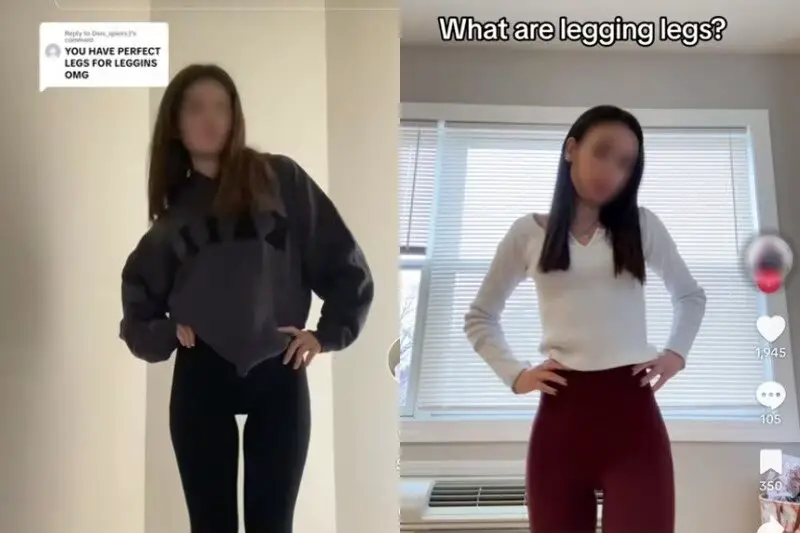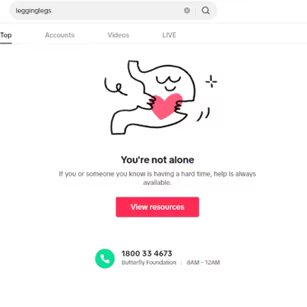A new TikTok trend called ‘leggings legs’ has been banned by the platform after being deemed dangerous.
The social media site can be a source of all sorts of interesting information.
But amongst this, there’s a dark side too.
The latest TikTok trend to take Gen Z by storm has received a mass backlash from users and it has even been banned from people’s feeds.
The ‘legging legs’ trend gained huge popularity on TikTok last year until the platform redirected all searches for the term.
Someone on social media says: “I have been crying for the past 4 hours because I don’t have ‘legging legs’ and my bf has been trying to comfort me the entire time.”
A second pens: “Do we understand that there are 15-year-old girls that wear leggings every single day that now feel that they cannot wear leggings because they don’t have legging legs…the most stupid thing I’ve ever heard in my life.”
Let’s start at the beginning, shall we?

‘Legging legs’ is a trend that sparks concern in young women about how their legs look in their leggings.
However, many millennial TikTokers have pointed out that this is essentially a repackaging of the harmful eating disorder trend for ‘thigh gaps’.
Australian fitness and lifestyle influencer Steph Claire Smith has spoken out to ABC about the trend.
“I remember being obsessed with having a thigh gap… because social media told me that that was what was attractive,” she reveals.
“If you have legs, and you’ve got a pair of leggings on, you have legging legs. Don’t worry what the internet is saying.”
Related Article: Gen Z Think That The Thumbs Up Emoji Is Rude And ‘Passive Aggressive’
Related Article: ‘Bed Rotting’ Is The Latest Trend Gen Z Are Obsessed With
Lauren Gurrieri, an associate professor of marketing at Melbourne’s RMIT, tells ABC how these trends are actually super harmful.
“When people consume content like this, it communicates a message that they need to engage in bodywork in order to achieve a specific and possibly unachievable ideal,” she says.
Gurrieri also explains that these sorts of trends are just repackaged eating disorder content, stating that: “A term like ‘leggings legs’ is simply code for skinny or thinness.”

“Being thin isn’t enough, you have to strive to achieve very specific ideals of perfection related to a part of your body,” she says.
“In this case, it’s having legging legs, in the past we have seen the same pressures for women to achieve a thigh gap or bikini bridge.
“They are very specific ideals related to women’s bodies that foster new ideologies of attractiveness.”
Therapist Holly Essler condemned the trend in a TikTok post, describing the trend as ‘repulsing’.
“This is disgusting,” she says in a video. “Do not let social media tell your body that it is a trend. If you have a body and you have leggings, you have legging legs.”
@empoweringyou.therapy♬ original sound – Holly Essler, LCSW
Viewers have taken to the comments section to thank Essler for speaking up on the subject, with one commenting: “Thank you for speaking up against these toxic trends that lead girls to so much insecurity and worse.”
Luckily, it seems as though TikTok is taking this pernicious new trend seriously.
The platform is now redirecting any search for ‘legging legs’ content to resources to help with the treatment of eating disorders.
“When people search for #legginglegs or content related to eating disorders, they are shown a pop-up with a link to the Butterfly Foundation,” a TikTok spokesperson confirmed to News.com.au.
“TikTok is an inclusive and body-positive environment and we do not allow content that depicts, promotes, normalizes or glorifies eating disorders.”
If you or someone you know is affected by any of the issues raised in this story, you can call BEAT Eating Disorders at 0808 801 0677 for the UK and the National Association of Anorexia Nervosa & Associated Disorders (ANAD) at (888) 375 7767 in the US.
Related Article: ‘Nose Cover’ Trend Young People Are Doing In Family Photos Has Finally Been Explained
Related Article: ‘Silent Walking’ Is The Latest Trend Gen Z Are Obsessed With
Do you have a story for us? If so, email us at [email protected]. All contact will be treated in confidence.






